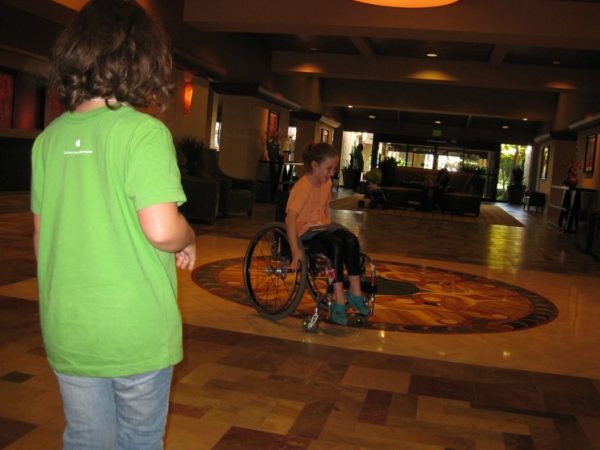
Multiple sclerosis in children
May 31st is World Multiple sclerosis awareness day. Do children suffer from MS and if so how serious is the condition and what are symptoms and treatments? To answer these questions, first we need to understand what is Multiple sclerosis and at what age it can appear?
Multiple sclerosis or MS is a neurological condition that effects nerves in the central nervous system – spinal cord and brain. Sclerosis means hardening or scarring of patches of tissues. Multiple because these tiny patches happen at more than one place in the brain or spinal cord. It is a common condition affecting young adults and three times more common in women than in men and diagnosis happens in their 20s and 30s. But, MS can be diagnosed in younger as well as older people.
Does MS affect children? Answer is yes. One in every 100 people with MS will experience the symptoms before the age of 10 and between 2 to 5 in every 100 people experience their first symptoms before age 18. Those who are diagnosed with MS might have had showed early symptoms of MS at young age.
Some of the important questions and answers regarding childhood MS are:
- Do children get MS?
Answer is yes. Some children show symptoms of MS in childhood but most in early adulthood. Reasons for causes probably same.
- What are the MS symptoms in children?
Weakness, problem with walking, problem with bowel and bladder control, change in vision, muscle spasms, numbness, sensory changes and tingling of body parts, tremors, difficulties with balance and coordination, weak leg muscles, anxiety, depression, difficulty in thinking- Children may also have seizures and lack of energy.
- What are the reasons to get MS?
Like many conditions MS is not inherited in predictable way and most people does not have family history of MS. Some genes might be present but not necessarily to exhibit MS. Before they reach puberty both boys and girls are diagnosed with MS. After puberty more girls are diagnosed with MS than boys which suggests that sex hormones changes play a part in getting MS.
- What are the types of MS?
- Relapsing -remitting MS- around 85% have this type of MS with first signs of the disease in early 20s. Relapses happens after the first attack time to time and weeks or years to recovery.
- Primary progressive MS – This gradually gets worse over time with no well-defined attack and little or no recovery.
- Secondary progressive MS: Most people after living with relapsing-remitting MS for many years will get secondary progressive MS. Symptoms begin a steady march and no relapses /remissions.
- How childhood MS is different?
Irrespective of age, MS is different for each person. Generally, children will make a complete recovery after first attack but might experience more relapses than adults.
First signs of MS are different for children. It might start with a nerve disorder “acute disseminated encephalomyelitis or ADEM”. This includes headache, confusion, seizures, stiff neck, fever, no energy and will go away after few days/weeks. These children will have physical disability at an earlier age. It might result in greater challenges in thinking ability and emotions that affect in their relationship with friends/peers, self-image and studies. About three quarters of children have fatigue and half of the children with MS experience anxiety or depression.
- What are the treatments for MS in children?
There is no cure for MS but treatments that are existing today can make child’s life better and suffer less. The goals of treatments are: to treat attacks, to prevent future attracts and to relieve all above mentioned symptoms of MS. Based on the symptoms and test results doctors will be able to suggest treatment options. Apart from some medications, treatment options include intravenous immunoglobulin (IVIG) and plasma exchange. IVIG is a therapy that help people with weakened immune systems to fight infections and several different conditions including neurological diseases.
Some of the symptoms of MS might occur in other conditions too. Talk to your doctor and get your child’s health checked for MS with proper diagnosis. Occupational therapist (to treat fatigue), neuropsychologists (for cognitive symptoms), counsellors (to discuss the impact of MS on daily life), physiotherapists (to helps with walking, balance and tremor) –all will help to manage the condition.
7. How MS affects child’s life?
MS is a lifelong condition. There is no cure except managing the condition. Having a healthy lifestyle plays a bigger role. Eating balanced food, exercise, stress management, various activities with family and at school helps. It is natural for parents to be concerned about child’s future. Many children with long term MS conditions are living normal life with a good career, going to universities, starting a family. Parents need to focus on the time and positive energy that they can spend to help their child’s growth and development to shape child’s future life.
For more on childhood MS please visit:
- https://www.mstrust.org.uk
- https://www.webmd.com
- https://www.moh.gov.sa
- https://multiplesclerosisnewstoday.com
- https://patientworthy.com/2018/05/20/pediatric-multiple-sclerosis-patients-treatment/
Image credit: “Pacificon” by Liz Henry is licensed under CC BY-ND 2.0
Author: Sumana Rao | Posted on: May 24, 2018
« How to address bed wetting problem in children? Nutrition questions for kids »






















Write a comment